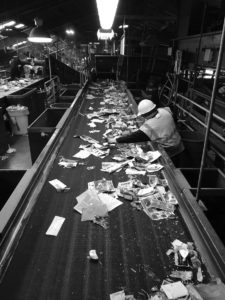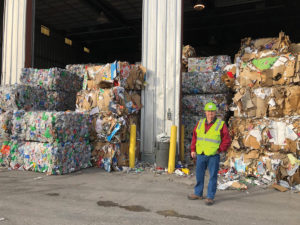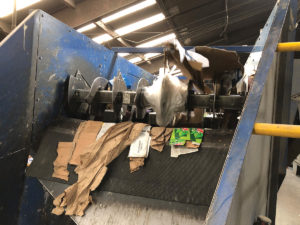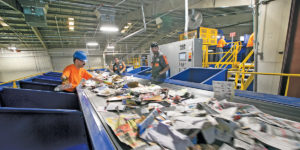Wasted
1/2/2019Lack of demand and consumer confusion are endangering recycling. Learn what you can do to help.
 Officials will consider removing glass from curbside recycling, building a new processing facility and doing away with residential single-stream recycling in the Des Moines metro area within the next few years. The potential for change is due to higher processing fees, limited product buyers and the contamination caused by users putting non-recyclable items in curbside bins.
Officials will consider removing glass from curbside recycling, building a new processing facility and doing away with residential single-stream recycling in the Des Moines metro area within the next few years. The potential for change is due to higher processing fees, limited product buyers and the contamination caused by users putting non-recyclable items in curbside bins.
NOTE: The difference between “dual-stream” and “single-stream” recycling methods pertains to the method of curbside collection of recyclables. Recyclables collected through a single-stream collection process arrive at the plant comingled, and they must then be separated.In a dual-stream system, items are kept separate when collected at the curb.
Des Moines instituted single-stream residential recycling in 2008, and since the change, product contamination has been an issue, reducing the quality and final price paid for processed recyclables, according to numerous sources.
“It’s early in the evaluation stage of perhaps going back to a dualstream set-up,” says Jonathan Gano, the director of Des Moines Public Works, which oversees the city’s recycling and solid waste collection.
Leslie Irlbeck, the public affairs manager at Metro Waste Authority (MWA), the local independent government agency tasked with overseeing the area’s landfill and handling various waste management duties, says that anything is on the table when it comes to discussions about how to improve the metro’s recycling program. That includes
going back to dual-stream collection.
“Residents want to continue to recycle,” she says. “There would be resistance if we went back to dual stream, but I think it’s probably something at some point we’ll need to study and do research to consider.”
REMOVE GLASS?

Recycled materials are sorted and compacted into bales before being shipped for reprocessing to various mills and facilities in other parts of the U.S. Mick Barry is pictured.
One proposal is to remove glass from the residential single-stream recycling program.
“It’s heavy and is hardwearing on the equipment at the processing system,” Gano says.
In a pilot program MWA is partnering with Ripple Glass to make it easier for residents to recycle glass items by featuring a drop-off center at the Metro Northwest Transfer Station in Grimes. According to Irlbeck, glass is more valuable when it is recycled separately, thus adding drop-offs points for glass containers could benefit the community.
Despite the challenges, MWA has a positive outlook. According to Irlbeck, public awareness efforts and investing in top-of-the-line equipment and technology are potential ways to compete in the recycling market.
“We can’t change the global market, but we (can) each change what we put in the cart,” she says. “We can’t keep doing things the same way.”
SINGLE-STREAM RECYCLING VIEWED AS “SILVER BULLET”
The City of Des Moines and MWA transitioned to single-stream recycling collection in 2007 and 2008. The idea was to make recycling easier for residents and safer for the front-line employees, thus increasing the total materials recycled and reducing workers’ compensation claims. For a while the goals were achieved.
“On the collection side, I think it’s fair to say the cost savings have materialized,” Gano says.
But then the markets tanked, and at the same time, more non-recyclable items began being put into the curbside carts, contaminating the recyclables, and revenues began to drop.
MWA lost $662,505 from its recycling programs in fiscal year 2017-18. The projected loss for 2019-20 is $933,000 — this takes into account all forms of recycling, not just curbside residential.
“The additional loss is primarily due to the decline in markets,” says Irlbeck.
Des Moines has lost money with its recycling program since its inception. In 2007, the year before the city switched to a single-stream collection service, the city lost $968,620. Part of that loss was to be offset with the change to single-stream recycling, and in the initial years — when there were more recyclables, and the demand was higher — the city received between $400,000 and $800,000 back from Mid America each year for its portion of the sale of recycled materials.
Currently, the 10,000 tons of recyclables Des Moines delivers to Mid America each year will cause the city to run a $50,000 deficit this fiscal year. Recycling costs for Des Moines residents is covered through solid waste collection
fees, but in some cities, residents must pay extra to receive a recycling cart. In order to offset some of the recent uptick in recycling losses, Gano’s department will recommend a 1 percent increase for fiscal year 2019-20.
HOW CAN RESIDENTS HELP?
It takes only one residence to contaminate a truckload of recycled material, says Mick Barry, the president of Mid America. This can be as simple as a resident not rinsing out recyclable containers from food waste, which then molds and decays.
Previously, if a homeowner put a non-recycled item in their Curb It! bin, an employee left the items in the bin for the person to dispose of another way.
Mid America employs more individuals than it did prior to residential singlestream recycling. These individuals work alongside the conveyor belts removing plastic bags, trash, food waste, non-recyclable materials and other contaminates.
Barry says residents need to understand this is a problem.
“We’ve had several citizens tell us to put more people on staff to clean up the mess,” he says. “No. Our jobs aren’t to clean up what you’re not supposed to do. Our job is to process the material and make it into new things.”
TRICKLE-DOWN ECONOMICS

Plastic bags often get wrapped around the sorting equipment at Mid America Recycling, causing the machines to stall.
This is a global issue: In mid-2017, the Chinese government, which had previously been the largest importer of many types of recyclable material, banned “foreign garbage” that included textiles, plastics and mixed paper. This weakened the demand for recycled materials from the United States, which ultimately affected the Des Moines area. Mid America hasn’t exported materials for eight or nine years, but it was affected when mills and other buyers were inundated with product from cities that did export and were no longer able to do so.
The materials that are processed at Mid America are shipped via truck and rail across the country to be made into vehicle dashboards, stain-resistant carpet, cereal boxes and more.
The value of recycled material is based on market conditions. The more demand, the higher the value. The higher the quality, the higher the value. The demand for residential single-stream mixed paper dropped so dramatically this summer, Barry says his company was forced to dump loads of recycled paper at the Metro Park East Landfill in Mitchellville.
As a result, Mid America, the No. 1 processor of residential recycling goods in the area, requested to renegotiate its contracts with Metro Waste Authority and the city of Des Moines. Mid America processes the recyclables for most communities with curb-side collection within a 75-mile radius of Des Moines. About 85 percent to 90 percent of the recycling Mid America processes comes from Metro Waste and Des Moines.
Metro Waste began paying Mid America $65 a ton in October to process recyclables. That number had previously been $18 a ton. This costs about $25,000 more each month. Irlbeck says so far that cost has not been passed to customers. The new contract will expire in November 2021. Des Moines pays Mid America $47 a ton. Mid America’s negotiations with Des Moines city officials began Dec. 12.
RESIDENTS USE RECYCLING CARTS TO DISPOSE OF ALMOST ANYTHING
Officials say some residents use their green Curb It! recycling cans to dispose of items they either don’t know how to get rid of or as a second garbage can. There’s also the “wishful recyclers,” those who want to be able to recycle every piece of plastic, paper, Styrofoam, pizza boxes, plastic bags and other items that seem recyclable but aren’t.
Plastic bags are particularly damaging to processing equipment because they’re light-weight and easily pass through sorting and then get wrapped around equipment and can lock it up, Barry says.
On a recent December day, recycling trucks dumped tons of residential recycled materials at Mid America Recycling’s process facility. These loads were littered with contaminates such as non-recycle materials that included area rugs, kiddie pools, garden hoses, lawn chairs, Christmas lights, a metal horse set, clothing, food waste, diapers and more.
Barry says employees put out fires daily caused from items such as batteries or pieces of metal that residents put into recycling bins and spark when dragged under equipment. Prior to single-stream residential recycling, 2 percent of the items that came into the processing facility were waste, and Mid America’s landfill bill was relatively nonexistent, he says. Now, there’s at least 20 percent waste, and the company has a monthly waste bill of $20,000.
“There’s no limits and no controls over what goes in the bins,” says Barry, who is the chairman of the National Recycling Coalition.
While Metro Waste wants to see as much recycling happen as possible and keep aluminum cans, plastic and other recyclables out of the landfill, Irlbeck says there are items that do belong in it.
“We believe part of our responsibility is keeping material out of there in the first place. Aluminum and tin cans and plastic and items that take a long time to biodegrade,” she says. “If we’re not, we’re creating a system where people can buy things and not turn them into new things, and then they’re buying virgin things and using up natural resources. It’s important we conserve space in the landfill, but at this point there are certain things that just belong in the landfill.”
Currently, solid waste is buried in 500 acres of an 1,800-acre lot that is the landfill. The Iowa Department of Natural Resources regulates the space and the permit for it, and Metro Waste anticipates those 500 acres can service the Des Moines metro until 2046, says Trish Radke, assistant to the executive director for Metro Waste.
Des Moines Public Works employees have switched to an education and enforcement effort in order to try to reduce the amount of garbage and non-recyclable material that goes into recycling carts.
Employees began conducting audits of curbside recycling carts. They look for junk and other garbage that could damage equipment such as carpet, textiles, lumber, pizza boxes and wet kitchen garbage. The city has rejected hundreds of carts since the auditing program went into effect this summer.
“We’re trying to catch it at the curb,” he says. “Curb-side quality control is the most effective way to leverage contact with the customers.”
The audits hit only a small fraction of households — the city collects recycling from 34,000 houses each week — but employees will do follow-up checks at offenders’ houses as they return to those neighborhoods. Residents could receive fines, as employees document and take photos of violations of the city code.
BUSINESS LEADERS LOOK AT ALTERNATE SOLUTIONS
The increase in rates and a decline in the market have forced Metro Waste officials to consider ways to create more efficiencies within their recycling program, consider the future of recycling and increase its public information campaign to better educate the public about what does and does not go inside the green Curb It! recycling containers. The organization will release the results of a feasibility study to its board at its next meeting.
“Ultimately, we have a responsibility to provide safe and smart recycling and disposal for our communities,” Radke says. “The study is going to give us some guidance as to how we can do that better. Obviously, recycling as it is right now probably isn’t going to be sustainable, and we as an organization are going to provide a solution that is responsible.”
Metro Waste Authority officials say they want to emulate the recycling processing center at the Scott County Area Recycling Center, which has been able to weather the down turn in the recycling market.
The facility was built in 1995 when Scott County started its recycling program. It services the cities of Bettendorf and Davenport along with communities as far away as Pella and some in Illinois. The center became a single-stream processing facility in 2016.
LIGHT AT THE END OF THE TUNNEL?

Chelsea and Jake Smith of Norwalk recycle almost everything they can and wish recycling was picked up every week.
Regardless of the costs involved, business and government officials agree recycling is here to stay.
It’s important for the environment to divert material from the landfill, Barry says.
Gano, the public works director, agrees: “We’re committed to doing recycling because it makes sense for a lot more reasons than just making money. All of that being said, you have to have a user of that commodity on the back end, or it’ll pile up. … As long as there is a demand for recycled products, we will continue to defer that out of our landfills.”
Barry says he thinks the collection of recycling and solid waste could combine to create an even larger single-stream system called “one bin.” A new materials recovery facility would need to be constructed in the Des Moines area to process the materials, which could be converted into a source of alternative energy. Barry says his company has been researching ways garbage can be vaporized and the vapors recovered to make energy.
Officials also think there is a light at the end of the tunnel. China’s decision to turn away the United States’ recycled materials has forced more mills to reopen within the country or to retrofit to accommodate recycled goods and to reprocess them into reusable materials.
“Investment in the paper business should be able to build upon the demand and restore enough value to the paper commodity market that single-stream paper will have a place to go and buyers for it,” Gano says.
There’s also been a slight rebound in some recycled material costs.
WHO’S INVOLVED?
Mid America Recycling, located southeast of downtown Des Moines, began its Iowa operations in 1979 in response to Iowa’s Bottle Bill. At one point in the late 2000s, the company was the nation’s largest privately held recycling company and processed more than 1.5 billion pounds each year and had 17 plants in nine states and more than 800 employees. The company has multiple divisions and processes recyclable materials for residential, commercial and industrial entities. The company’s other four business units support the residential recycling unit, which President Mick Barry says loses money. The current facility has been in business since 1989. Mid America sold its operations but returned to operate the Des Moines plant in 2015 and a plant in Lincoln, Nebraska, in 2014.
China was previously the largest importer of many types of recyclable material. As China became more westernized, Chinese President Xi Jinping decided the country would become less reliable on international exports to create its products and would instead rely on its own processed recyclables. In 2017, the Chinese government banned “foreign garbage,” textiles, plastics and mixed paper it had previously imported. This weakened the demand for recycled materials from the United States, which ultimately affected the Des Moines area. Jinping mandated the most populated Chinese cities start their own recycling programs by the end of 2019.
Metro Waste Authority, an independent government agency comprises 16 communities and Polk County, manages the landfill for the county area and operates a compost center, transfer station, hazardous waste drop-off, recycling drop-off, the Curb It! residential recycling program that provides service to 145,000 households, the Compost It! yard waste collection and more.
City of Des Moines collects its own recycling and solid waste through its Public Works Department. The city charges residents a monthly fee for collection. It contracts with Mid America Recycling and pays the materials recovery facility to process its recyclables and sell them.
WHEN IN DOUBT, THROW IT OUT
Metro Waste Authority provides guidelines on its website, www.mwatoday.com, for what items can go into the Curb It! bins.
Mick Barry, the president of Mid America Recycling, which is the materials recovery facility that processes Metro Waste’s residential recycling items, says most people are wishful recyclers and want to be able to recycle more than the industry allows.
“The message we’ve been trying to put out is: ‘When in doubt, throw it out,’ ” he says.
All food containers need to be rinsed before they are placed in the Curb It! container.
“You want us to make a pop bottle out of a pop bottle, but we can’t do that if it’s already got pop in it,” Barry says.
Here is a list of items that can be recycled:
•Paper including glossy magazines, mail, envelopes with clear plastic inserts, toilet paper and paper towel cardboard rolls, gift bags — cut off the handles first, gift wrap but none with metallic foil or glitter
•Cardboard boxes
•Shredded paper that is contained in a paper bag or box
•Paper cartons including waxy-coated food and beverage cartons. Rinse these first and throw away the plastic twist-off lid.
•Glass jars and bottles of any color. Rinse these first. The metal lids also can be recycled.
•Aluminum and tin cans
•Plastic containers with twist-off lids with the lids attached. Rinse these first.
•Yogurt and margarine tubs without the lids. Rinse these first.
Here are items that cannot be recycled and should be placed in a solid waste container:
•Most plastic tubs such as sour cream, cottage cheese and cool whip, as well as berry containers and convenience store cups.
•Twist-off hazardous waste plastic containers
•Toys
•Plastic bags. Take these to a grocery store that recycles them.
•Pyrex or baking dishes
•Window or mirror glass
•Coated paper coffee and fast-food cups
•Tissue paper, photo paper, photos or carbon paper
•Clothing
•Styrofoam
•Aluminum pans or foil
•Metal objects
• Electronics
• Paper towels and napkins
• Paper plates
• Gift boxes
Metro Waste Authority advises residents to disregard the numbers on the bottom of plastic containers and instead to recycle plastics with a twist-off lid.
WHAT HAPPENED WITH THE PAPER AT THE LANDFILL?

Scott County Area Recycling Center employees sort through recycled materials.
Barry says the mixed-paper market became so saturated this summer, that for four months his company was unable to find buyers.
Initially, the company stored as many bales of mixed paper in its Des Moines’ operation until it ran out of space and the paper became a fire hazard. Rather than lose money by paying a mill to take the material, Barry says the company took it to the Metro Park East Landfill in Mitchellville.
According to Metro Waste Authority, which oversees the landfill, Mid America brought 1,658 tons of mixed paper to the landfill during a four-month period. Of that paper, Metro Waste diverted 1,289 tons — more than the amount generated through the Curb It! program — to buyers who used the product and by composting the paper on site.
Metro Waste’s actions were “true to our vision of ‘No Wasted Resources,’ ” says Leslie Irlbeck, Metro Waste Authority’s public affairs manager. “We hated to see something with value landfilled.”
In total, 368.92 tons of mixed paper was put into the landfill during a four-month period this summer, she says.
Irlbeck says Metro Waste employees worked around the clock to prevent as much of the paper as possible from going into the landfill because of its commitment to its member communities.
“It’s so important people know when they put something that’s a good valuable material in their recycle cart, it’s going to be recycled,” she says.
Barry says Mid America is within the realms of its contract under the loss-market contingent to take material to the landfill if the facility is overloaded, cannot find a buyer and would lose a certain percentage of money. The company risked losing between $100 and $200 a ton to pay freight costs and other companies to process that paper. It chose to pay a cheaper cost, $40 to $60 per ton, to take the paper to the landfill instead.
TWO SIDES TO THE STORY

Kathy Morris, director of the Waste Commission of Scott County, which oversees the Scott County Area Recycling Center
Chelsea and Jake Smith recycle and compost as much as possible from their Norwalk home. This includes aluminum and tin cans, paper products, cardboard and plastic.
“I’m sure we’ve probably put things in there that we shouldn’t have, and I’ve learned to read labels a bit more carefully,” she says.
The couple moved to Norwalk from Aurora, Illinois, where they had weekly recycling pick-up. Chelsea says they easily could continue with weekly recycling and have their trash picked up once every 10 days to two weeks. The Smiths end up having to place some of their recycling items in their solid waste container because they have so many.
She says the picture on the Curb It! container is helpful when she has questions about whether to recycle an item. She also utilizes recycling labels on food containers to try to determine whether something can be recycled.
“I thought all of the cardboard could go in, but after I read the label, it said clean and dry,” Chelsea says. Chelsea rinses out each food container with warm water but says she sometimes forgets.
“I try to make sure it’s as clean as possible,” she says. “We’re trying to be less wasteful. That’s how we grew up. We were taught to recycle as much as possible. We care about what happens with Iowa. We love it here, and I think in our mind if we recycle, we’re doing the best we can to take care of where we live.”
Keshia Ingledue-Hernandez tosses recyclable items along with her regular solid waste into a large dumpster outside of her West Des Moines apartment each day.
She lives with her husband, Fulgencio, their four children, and her sister, and she estimates the family produces 17 pounds of trash a week.
The complex does not offer recycling containers even though Ingledue-Hernandez read it did offer recycling in the lease and has inquired about it. She throws away milk jugs, cardboard boxes and other recyclable material.
She believes recycling is important for the environment and that people should do it, but she doesn’t out of lack of convenience.
“I would say I would if I had the opportunity and it was closer,” she says. “It’s just not convenient with as many people who live here to keep it all here.”
The family does keep its aluminum cans and other items that can be redeemed but throws out food boxes, milk jugs and more.
WHERE DOES IT ALL GO?
Recyclables that come to Mid America Recycling are sorted, processed and baled to be sent to mills and other businesses across the country:
Indiana: Steel is sent to mills to be made into rebar or cans.
Alabama: Milk and colored jugs are sent here to make the plastic cases for batters and dashboards.
Georgia: PET bottles are recycled and made into stain-free carpet.
Chicago: Aluminum goes to a secondary smelter to be melted down.
Oklahoma, Wisconsin and Oregon: Cardboard is sent here to be broken up and made into new boxes. ♦















The sad fact is that recycling is impossible. What naive idealist thought that every person would rinse out their can of dog food or butter wrapper?! The solution has to be at the processing end. New technology is the only way to realistically deal with “garbage”!